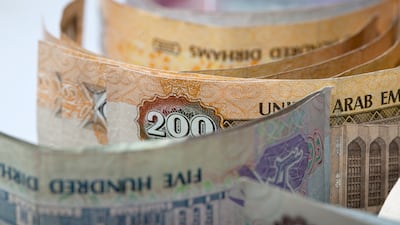The Central Bank of the UAE has issued new guidelines to help licensed financial institutions (LFIs) – which lend to cash intensive businesses (CIB) such as those in retail, trading, travel and transport – combat money laundering and the financing of terrorism.
LFIs that provide services to CIBs must take a risk-based approach in their anti-money laundering (AML) programmes and assess CIB customers to determine their degree of risk, the regulator said in a statement on Sunday.
CIBs are businesses that experience a high volume of cash flows, spanning various industry sectors such as retail, wholesale and trading, travel and transport, according to the central bank.
“LFIs must perform appropriate customer due diligence that comprises customer and beneficial owners identification, understanding of the customer business and ongoing monitoring of the business relationship,” the central bank said.
LFIs should also obtain appropriate information regarding the source of cash deposited in a customer’s account as well as mandate the use of Emirates IDs for cash deposits in ATMs.
Additionally, LFIs should maintain transaction monitoring systems to identify patterns of potentially suspicious activity that may be linked to money laundering, the financing of terrorism or a criminal offence, and submit transaction reports directly to the UAE’s Financial Intelligence Unit using the goAML portal, the statement said.
The UAE has revealed various measures to fight and prevent money laundering in the last few months.
Dubai set up a specialist court in August to focus on fighting money laundering and other financial crimes in a bid to strengthen the integrity of its financial system. The Dubai Misdemeanour Court convicted eight people and three companies of cyber fraud and laundering stolen funds amounting to about Dh14 million ($3.81m) earlier this year.
It also fined an exchange house operating in the country almost Dh500,000 ($136,000) for failing to achieve appropriate levels of compliance with anti-money laundering regulations in April.
“The new guidance affirms our commitment to implement high regulatory control over LFIs and their transactions with cash-intensive business activities and to complement with the UAE’s path to actively participate in international efforts to AML/CFT,” said Khaled Balama, governor of the Central Bank of the UAE.
“We will continue our efforts to issue similar regulatory guidelines to ensure enhancing the efficiency and robustness of our banking and financial system, in line with the Financial Action Task Force (FATF) standards."
The latest guidelines came into effect on September 28, according to the banking regulator. LFIs have been given a month to comply.
The UAE has also joined other countries to clamp down on money laundering.
In August, the Financial Intelligence Unit joined forces with the China Anti-Money Laundering Monitoring and Analysis Centre to exchange information and help crack down on global money laundering and terrorism financing.

